CREATING THE NEXT GENERATION OF INNOVATORS
Student researchers fuel discovery

SUPPORT FOR FINALS AND THE COMMUNITY JAYDOC FREE CLINIC TURNS 20 Spring 2023
A NEW HOME ON THE HILL
More than 400 KU alumni and friends flocked to the Jayhawk Welcome Center during its grand opening February 25. Visitors are greeted by a two-story LED display with a personalized message, and this is only the beginning of what the Welcome Center has to offer.
Six unique, interactive exhibits engage visitors in learning about the legacy, achievements, origins, networks and traditions of what it means to be a Jayhawk. Supported entirely through private philanthropy, the state-of-the-art Welcome Center is an example of the strength of the Jayhawk Nation and a source of pride for all of us.
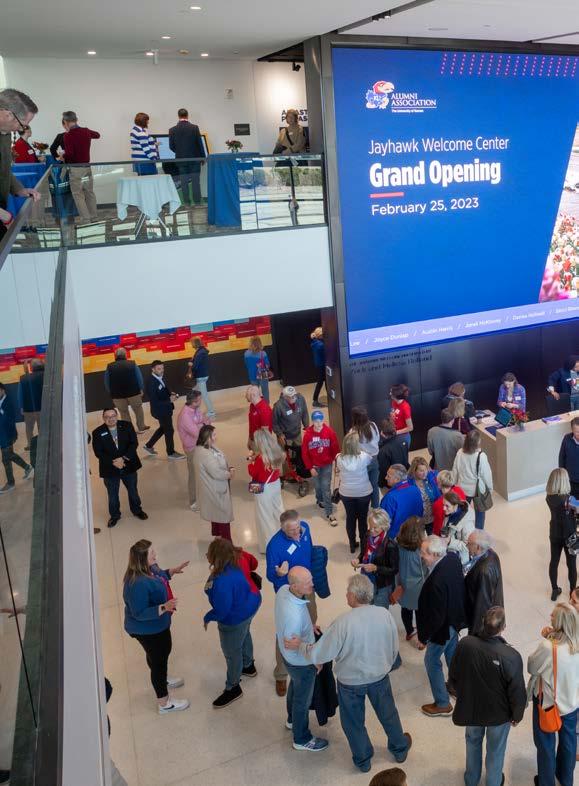
SPRING 2023
KU Giving is published by KU Endowment, the private fundraising foundation for the University of Kansas. You are receiving this magazine because you support KU.

CHAIR, BOARD OF TRUSTEES
Lydia I. Beebe
PRESIDENT
Daniel J. Martin
AVP, COMMUNICATIONS AND DONOR RELATIONS
Michelle Keller
SR. DIRECTOR, CREATIVE AND EDITORIAL SERVICES
Daryl Bell
PUBLICATIONS DIRECTOR
Valerie Gieler
SENIOR ART DIRECTOR
Sarah Meiers
ASSISTANT ART DIRECTOR
Jennifer Walker
CONTRIBUTING WRITERS
Emily Becker
Daryl Bell
Jodi Bouyack
Haines Eason
Valerie Gieler
Emily Kruse
Shelly Triplett
Pamela Urlacher
We welcome your comments, suggestions and questions.
KU Giving magazine
P.O. Box 928
Lawrence, KS 66044-0928 785-832-7400
kugiving@kuendowment.org
Postmaster: Send address changes to: KU Endowment
P.O. Box 928
Lawrence, KS 66044-0928
ON THE COVER
KU senior Thresa Kelly is an undergraduate researcher studying properties of supermassive black holes. Photo by Mark McDonald.
PHOTOGRAPHY
Ann Dean, 10, 12, 13, 18, 19 • Haines
Eason, 8 • KU Endowment/Valerie
Gieler, 15 • Mark McDonald, IFC–1, 2, 3, 7, 8, 11, 12, 13, 16, 17 • Steve Puppe, 4 •
• University of Kansas/Jon Blumb, 21
• University of Kansas/Emma Jensen, 21 • University of Kansas/Meg Kumin, 5, 20, BC • University of Kansas/ Andy White, 4, 5 • University of Kansas/Spencer Museum of Art/Ryan
Waggoner, 25 • Contributed 4, 5, 20, 21, 22, 23, 24
5416
KU CONNECTIONS
AS A LIFELONG KANSAN AND THREE-TIME UNIVERSITY OF KANSAS GRADUATE, I have been part of the KU community as long as I can remember. I was not sure I could become more of a Jayhawk, but spending time on our campuses and working to benefit KU has deepened my connection to the university and to fellow Jayhawks who share a love for this place.

Spending time in our command center during the sixth One Day. One KU. and watching the number of gifts and dollars climb was so much fun! The icy conditions in Kansas did not have a chance to chill spirits as Jayhawks around the world united to support KU and The University of Kansas Health System. The day was full of energy as people shared stories and joined in activities online and on KU campuses.
One Day. One KU. celebrates the power of ONE, and this year was no exception. One person can make a difference. One gift can change a Jayhawk’s life. The collective impact of people coming together one by one is transformative. In just 24 hours, Jayhawks raised more than $3.2 million from 4,740 gifts — all to benefit programs, people and initiatives at KU.
Another recent inspiring occasion was the opportunity to experience the opening of the Jayhawk Welcome Center with alumni and friends. The Welcome Center — your new Home on the Hill — immerses visitors in the incomparable KU experience and expresses what it means to be a Jayhawk through innovative storytelling and state-of-the-art technology.
Seeing the reaction on people’s faces the first time they entered the building was a true joy, seconded only by taking a moment to appreciate the collaboration that made it possible. From students, faculty, campus leaders and partners to alumni, friends and donors, a lot of talented people worked together to realize this vision. I am proud to share that the $29.4 million project was funded entirely through private gifts to KU Endowment — it is a place for Jayhawks built by Jayhawks.
The Welcome Center connects past, present and future Jayhawks and creates a campus visit that few, if any, universities can match. It is one of a kind and can only be fully appreciated in person. If you have not been back to campus in a while, now is a great time to plan a visit.
Rock Chalk! Dan Martin
PRESIDENT’S NOTE 2 KU | Spring 2023
NEIGHBORLY TIES UNLOCK MILLIONS IN RESEARCH FUNDING

AS NEIGHBORS, CHARLES AND CAROLYN
KELLOGG have known Holly Hull and her family for at least 12 years. They’ve watched Hull’s daughter grow up healthy and strong, becoming, among many things, a softball pitcher. And, they’ve naturally learned about Hull’s research as an associate professor of dietetics and nutrition at the University of Kansas Medical Center. Hull and her team study how a mother’s environment and diet can affect her and her baby’s long-term health.
In their lives beyond the neighborhood, the Kelloggs are directors with the Goppert Foundation (Charles is also an officer), an organization that funds capacity building at medical facilities, civic organizations, educational institutions and elsewhere.
It just so happens that Hull’s work hinges on machinery that can scan a person’s body to report on its composition — the percentage that is bone, muscle, fat, etc. But, her two legacy machines were only so useful. One could only scan a study participant from birth to five months, and the other only from age five onward.
Hull had come to the conclusion that a dual-energy x-ray absorptiometry — or DXA (pronounced dex-ah) — machine could give her uninterrupted access to cohorts of pregnant mothers and their babies from the prenatal stage well into life. “The DXA is critical to all the work I do,” she said. “It really can replace my other machines and provides so much more information.”
In 2017, the Kelloggs encouraged Hull to apply for a $55,000 Goppert Foundation grant to cover the purchase of a machine. She was approved, and, to some extent, the floodgates opened.
“The machine has done very well for her and KU,” Charles Kellogg said.
Indeed. The grant and machine helped Hull secure roughly $2.5 million in National Institutes of Health (NIH) funding, and additional grants are in the works. In the world of research, this is top-shelf grant money. Now, Hull and her team of doctoral candidates and staff can study candidates from conception through several years of life. The goal? Understanding how nutrition affects both mother and child.
“My purpose through my research?” Hull asks, rhetorically. “To better peoples’ lives.”
She’s humble in her straightforwardness. In essence, Hull and team scrutinize dietary adjustments that might unlock optimal cognition and body health for mother and child.
“Holly is a top-level thinker,” Carolyn Kellogg said. “Very caring, too. With her goals, her work, everything is well thought out.”
From $55,000 to millions, all to better generations yet to be born. And, it all happened thanks to a little old-fashioned neighborliness.
REWARDING DEVICE: The addition of the DXA machine to the lab of KU Medical Center associate professor Holly Hull, Ph.D., allows the research team to do body composition scans throughout a person’s life and has resulted in external grant funding.
HAINES EASON
EVERY GIFT MATTERS www.kuendowment.org 3
WHY I GIVE
“The Victor E. and Caroline E. Schutte Foundation supports efforts to improve the health of Kansas City area residents and invests in activities that facilitate the development of the life science industry in our region. The opportunity to fund a new professorship in cellular therapeutics meets both of those objectives. The Foundation is confident that its gift will significantly enhance the quality of life in our community.”
David Frantze, Trustee, Victor E. and Caroline E. Schutte Foundation, Kansas City, Mo. Gift to establish a Professorship in Cellular Therapeutics at KU Cancer Center
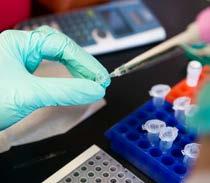
“I began my time at KU as a junior in a summer National Science Foundation Undergraduate Research project under Dr. Don Green. The Petroleum Engineering program gave me the fundamentals to succeed as a reservoir engineer. As petroleum engineering evolves, research will be an important part of this process, and we wanted to ‘Gift Forward’ to help in the evolution of future KU Petroleum Engineers.”
Roger Heckman, bachelor’s in petroleum engineering 1971, and Brenda Heckman, Breckenridge, Colo.
Gift to the Roger and Brenda Heckman Endowment for Engineering Research
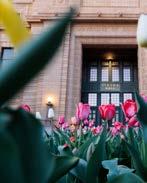

“Both my wife, Sarah, and I are proud graduates of KU. When I was taking an advertising course taught by Professor James Dykes, we were to design a fundraising brochure for KU Endowment’s Greater KU Fund. That made an impression on me. During my 40-plus-year career in not-for-profit organizations, I was either actively raising money or teaching other people how to raise money. I soon learned the value of undesignated contributions. If you are giving to an organization that you believe in, let them determine how and where to use the money. We are fortunate in our retirement to be able to support organizations and institutions that have been important in our lives.”
John Erickson, bachelor’s in journalism 1965, MBA 1967, and Sarah Erickson, bachelor’s in education & human sciences 1967, Keller, Texas Gift to the Greater KU Fund
“ We wanted to ‘Gift Forward’ to help in the evolution of future KU Petroleum Engineers.”
GIVING SNAPSHOTS 4 KU | Spring 2023
—Roger and Brenda Heckman
“Our support of multiple sclerosis research is integral to our mission to help those living with MS right now. Through Dr. Sosnoff’s work, we’re able to help move the needle on key lifestyle adjustments that are proving to make a significant impact on the quality of life for those affected by MS.”
Ashley (Kumlien) Schneider, Milwaukee, Wis., President of MS Run the US Gift to the MS Run the US Research Fund –Sosnoff
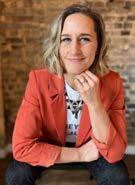
“Catherine and I give, not only because her parents were long-time faculty members in English and continuing professional studies, but because the KU Law School has given me the chance to share my career-long experience in health law with dozens of bright, engaged 2L and 3L law students. It has been one of the true joys of my career.”
Guy Collier, KU Law School Professor of Practice, and Catherine Colyer, Kansas City, Mo. Gift to the KU Law School


“We’re honored to be able to set up this scholarship to help students who are the first generation in their family to attend college as tribute to our parents’ spirit of volunteerism and generosity.”
Patrick Malone, bachelor’s in American studies 1972, and Vicki Neighbors Malone, bachelor’s in commercial art 1970, Chevy Chase, Md. Gift to establish the Clifford and Eleanor Malone Scholarship

“The first time I walked on campus, I could immediately tell I had found my new home. I still think the best years of my life have been at KU. I met my wife, we were married in Danforth Chapel and I learned skills and lessons that transferred over into a career that has afforded me a great life. We have a son who graduated from KU Engineering School, one who is currently enrolled in the Business School and one defector in Ames, but we love him anyway. Our Jayhawk pride runs deep. We give back to different schools to allow the next generation to experience not only a great education but the lifelong love that comes with being a Jayhawk.” Jim Goodmiller, bachelor’s in journalism 1991, and Kristin Goodmiller, bachelor’s in social welfare 1992, Saint Charles, Ill. Gifts to student opportunity funds
 Ashley (Kumlien) Schneider
Ashley (Kumlien) Schneider
www.kuendowment.org 5
STUDENTS ARE INVENTING THE FUTURE
UNDERGRADUATE RESEARCH IS CENTRAL TO THE KU EXPERIENCE
BY VALERIE GIELER
It is a typical day at the University of Kansas. Properties of supermassive black holes are being compared using data from the James Webb Space Telescope. An exhibit about the history of Clinton Lake is being curated at the Spencer Research Library. Societal concerns are being examined through the lens of a camera. The damage of a laboratory truss bridge is being investigated. A drug is being synthesized to regenerate bones in patients who have undergone radiation therapy. None of these activities are surprising for a major research and teaching university such as KU — until you learn that all this work is being conducted by undergraduate students.
Where students claim their curiosity
As an Association of American Universities (AAU) member institution, KU has always strongly believed in undergraduate research. This mission was formalized in 2012 when the Center for Undergraduate Research (CUR) was established as part of the Bold Aspirations strategic plan. The university offers undergraduate research opportunities in every department, giving students the chance to participate in research no matter their major. CUR supports traditional one-on-one research mentorship and also
works with faculty to develop projects in their classes to allow even more students to participate in undergraduate research.
“It is well known that being involved in research as an undergraduate is a high-impact practice that allows students to thrive, feel like they belong in their major and their university and succeed in their classes, as they see the real-world applicability of what they are learning,” said Alison Olcott, director of CUR.
Triannual Undergraduate Research Symposiums provide opportunities for students to present on topics of their choice. Students can also apply for Undergraduate Research Awards (UGRA), which provide $1,000 to support original research or creative projects, and Undergraduate Travel Awards up to $500 to help fund expenses to present research at a professional conference. CUR has resources and consultations available to help students find research experiences and successfully complete them.
“Undergraduate research hones students’ critical thinking, analytical skills, organizational, time management and communication skills,” said Dawn Tallchief, assistant director for student programs at CUR. “It also helps define a student’s academic and career interests.”
6 KU | Spring 2023
Galactic inspiration shifts career path The opportunities to explore subject areas and careers through research has helped KU senior Thresa Kelly chart her future. While she always had an interest in astronomy, Kelly originally thought she would work as an electrical engineer on satellites.
“After coming to KU, I found that I don’t like electrical engineering as much as I thought, but I do really enjoy computer science,” Kelly said. “And then I started working with Dr. Allison Kirkpatrick on an astronomy research project and took more astronomy classes.”
The research project uses images and data from the James Webb Space Telescope to identify active galactic nuclei (AGN) or supermassive black holes. Kelly’s computer science background helped her organize the data collected, build charts and interpret the results.

The AGN research at KU led to Kelly being accepted into a Research Experience for Undergraduates program at the University of Hawaii Institute for Astronomy in summer 2022. She lived on campus and worked at the institute for 10 weeks. “The Institute for Astronomy has access to some of the world’s best telescopes located up on Mauna Kea, and we actually got to visit all the telescopes,” Kelly said. “That was one of the highlights of the experience.”
Kelly’s research at the University of Hawaii focused on comparing multiwavelength properties of identified AGN. It resulted in oral and poster research presentations at professional conferences, and she is currently writing a first-author paper submission to an academic journal.
These experiences helped Kelly refine her engineering physics degree to include a concentration in digital electronic systems and minor in astronomy. She aspires to earn a doctorate in astrophysics and become a professional scientist. “The most important thing with getting involved in research is having an interest to learn more,” she said.
www.kuendowment.org 7
STUDYING SPACE: Thresa Kelly’s research projects involving the James Webb Space Telescope and the University of Hawaii Institute for Astronomy fueled her passion for a research-focused career studying supermassive black holes at the centers of galaxies.
SOCIAL EXPLORATION: Anxiety, uncertainty, loneliness, polarization and divisiveness are some of the topics Tomas Andreas investigates through his photographic art. His project, Tomorrow Never Knows , began as a reflection of the pandemic, but he feels it will continue to evolve.
The art of expression
KU photography student Tomas Andreas believes art conveys the emotions of a point in time beyond the facts, and this became the driving idea behind his artistic research project, Tomorrow Never Knows. Funded by a UGRA, the project explores the anxiety, uncertainty, loneliness and polarization many people experienced during the height of the COVID-19 pandemic and how media, world leaders and social media played a role.
“Fine art has an important place in society, and having an artifact of a period serves society as a whole,” Andreas said. “The pandemic was an unprecedented time, and I wanted to capture it.”
Most of Andreas’ work is in black and white. He developed a technique where he uses motion and in-camera blur for his photographs. For Tomorrow Never Knows, he decided to focus on his experiences and those of his girlfriend and fellow KU student, Chloe Grimm. One representative
image in the collection is of a hand reaching out for support. Titled Off Balance, the photo captures the anxieties Andreas was experiencing.
“I have a heart condition and sometimes struggle with coordination. I needed to isolate at times, and it was scary,” he said. “There are also contradictory elements and moments of joy, such as the image of Chloe dancing.”
Although the research award portion of Andreas’ project is complete, he says the work will remain relevant. “I think society is now transitioning into other periods of uncertainty and anxiety with the war in Ukraine and inflation. It’s all connected and will continue to evolve.”
After Andreas graduates this May, he has not decided yet if he will pursue graduate school. For certain, Andreas will have a camera in hand and focus on his photography studio and fine art gallery shows.

8 KU | Spring 2023
A petri dish of possibilities
KU junior Navya Singh has always been fascinated by how things work but was not sure what she wanted to do in college. She was intrigued by research and wanted to go to a big school that still felt like a close, small-knit community since she would be studying far from her home in Chandigarh, India. KU’s strong research focus and celebrated University Honors Program made it a dream school for her.
To find her passion, Singh decided to try out everything she likes. “I took random classes, joined various clubs and reached out to a professor to work in their lab, just because those things sounded cool,” Singh said. “My only goal was to take advantage of as many opportunities as I could.”
One of those opportunities included a radiology oncology research experience at KU Medical Center her freshman year. “My summer research fellowship showed me how much I love interacting with patients,”
she said. “This has made me interested in pursuing the M.D.-Ph.D. track in medical school, so I can do research and become a physician.”
Singh has been working in the Laird Forrest Lab for the past year through a Kansas Idea Network of Biomedical Research Excellence (K-INBRE) fellowship. Her project is about synthesizing a drug with the potential to regenerate bones in patients who have undergone radiation therapy. “I enjoy reading about the theory behind it as much as I enjoy making the drug in the lab,” she said.

She works 20 hours a week during the school year and 40 hours a week during breaks to make ends meet at college. “My scholarships and awards have been so impactful to my journey,” Singh said. “They also reaffirm my belief in the work I do in the research and KU community, as they show my work is being recognized.”
STUDENT SUPPORT: Scholarships and awards have helped Navya Singh get involved on campus and also with her plans to study in Norway in summer 2023. “Most activities I do at KU would not be possible without the generosity of donors,” she said.
www.kuendowment.org 9
Mentors bridge student’s experience
While in third grade, KU senior Curtis Nelson wrote a book titled Me, Myself and I for a class project. In it, Nelson said his plan was to attend the University of Kansas and study architectural engineering. The rest, as they say, is history — or engineering, rather. Nelson has always loved math and physics and his childhood mentor is a KU alumnus in the field. “I predicted the future for myself, but I also made the choice to pursue this passion,” he said.
Nelson became involved with research freshman year while looking for a campus job. This experience was outside his major, but he appreciated the practical, hands-on knowledge. His current engineering research project is a forensic study of a laboratory model truss bridge damaged during a move. All the bridge’s bars have to be parallel or perpendicular to one another at a 45-degree angle to be useful for testing. Nelson is assessing the damage and creating a repair plan.

The educational journey has not always been easy for Nelson as he has been primarily supporting himself since age 16. Obtaining a degree would not be possible without his research awards, research assistantships and scholarships. “This support has made it so I can really invest in my education and take care of myself,” he said.
Nelson has an engineering internship this summer and is returning to KU for a master’s in civil engineering in the fall. His goal is to earn his professional license, obtain a doctorate in structural engineering and become a professor. Inspirational mentors including Elaina Sutley, associate dean for DEIB, and Jian Li, associate professor of Civil, Environmental & Architectural Engineering, have made a difference during Nelson’s journey.
“College is difficult, and especially so for underrepresented students,” Nelson said. “I have a passion for helping the ‘me’ of the future and leveraging my knowledge, skills and resources to assist students.”
Discovering untold stories
KU history major Claire Cox has a passion for bringing hidden stories to light. “Telling a story no one has heard might change someone’s perspective of the world,” she said.
As part of an internship and with support of a UGRA, Cox is currently working to curate an exhibit at the Wakarusa River Valley Heritage Museum about the Native American history submerged beneath Clinton Lake. She is also putting together
10 KU | Spring 2023
BUILDING A NETWORK: Developing connections with faculty, graduate students and peers has been an important part of Curtis Nelson’s research involvement at KU. These relationships have been vital in helping him obtain scholarships and internships.
REVEALING HISTORY: The idea that there are hidden stories out in the world waiting to be uncovered is what intrigues Claire Cox the most about our past. “History is extremely important to understand who we were in the past and who we might become in the future,” she said.
a small exhibit for the Spencer Research Library, where she is a student employee, about Clinton Lake and the residents who were displaced. “Museums are so valuable because they are open to the public and anyone can walk in and learn something new,” Cox said.
The most important thing she has learned working within museum spaces? How you present information and who gets to tell the story are more important than the information itself. “If you are going to tell a story, you should include the communities you are speaking about in the process,” she said.
This experience is directly related to Cox’s future goal of becoming a museum curator and a professor and possibly writing a book. She will graduate with a bachelor’s in history in May and earn her master’s in history and bachelor’s in global and international studies in 2024. She also has plans to pursue a doctorate in history. “I hope to leave behind a published book or journal articles that contributed to the field of history,” Cox said. “That’s what intrigues me so much about research.”
Higher education means a lot to Cox, and she typically works more than 30 hours a week during the semester to make her degree programs possible. “The financial cost of education is a big factor,” she said. “Through academic scholarships and the Undergraduate Research Award, I’m able to fund my college experience and the research projects I find very meaningful.”
Supporting research
Philanthropy allows CUR to directly support undergraduate students as they explore the research opportunities available to them. The center’s donor-funded awards include the K. Barbara Schowen Research Mentor Award honoring the contributions of faculty who mentor undergraduate researchers, and the Courtwright Award for Undergraduate Research Excellence, awarded to a top undergraduate researcher who has received a UGRA. These types of awards can make a significant difference to a student. “A group of distinguished professors on campus recently donated money to support emerging scholars and provide mentorship training to graduate students, and all gifts on One Day. One KU. have been used directly to support students,” Olcott said. “We are very grateful to our donors.”
The center’s ongoing mission is to support undergraduate research in all disciplines and at all levels. “We want students to understand that undergraduate research is for them, whether they are majoring in the humanities, the arts, the social sciences or the sciences, and whether they are a first-year student or a student in their last year,” Olcott said. “Our goal is that by the time students graduate, they understand what authentic research and creative pursuits look like in their field.”
HELP FUEL DISCOVERY
To support student researchers and the CUR, contact Whitney Escalante at wescalante@kuendowment.org or 785-832-7463.

www.kuendowment.org 11
A CELEBRATION OF KU SPIRIT


JAYHAWKS
RALLY FOR ONE DAY. ONE KU.


Thanks to all the generous donors who participated in One Day. One KU., the sixth annual 24-hour giving day was an uplifting success! On February 16, 2023, Jayhawks across the world showed their KU spirit by donating a total of $3,219,345 from 4,740 gifts. Jayhawks came together to support programs and initiatives across all five KU campuses: Lawrence, the Edwards Campus in Overland Park, and the medical branches in Kansas City, Wichita and Salina, along with The University of Kansas Health System.
An impressive 242 donors have perfect records, giving on One Day. One KU. each year since 2018. Also inspiring, 522 donors made their first-ever gift to the university on giving day. Gifts came from 49 states and nine foreign countries, including Canada, France, Great Britain, Kosovo, the Netherlands, New Zealand, Switzerland, Turkey and the United Arab Emirates. The Lawrence community also showed their support with more than 50 local businesses posting signs to spread awareness.
Donors — including the chancellor and 22 vice chancellors, deans and directors — created 143 matches and challenges that contributed to the day’s success and resulted in more than $729,000 in gifts. The four areas that received the most gifts were Monarch Watch, Kansas Athletics, the Alzheimer’s Disease Research Center and student scholarships. Interacting with students, faculty, alumni and friends online and at campus events was a highlight of the day.
Save the date for next year’s One Day. One KU. on February 15, 2024, as Jayhawks show the power of their gifts to lift the university once more.
PRETTY PAINTINGS: On-campus events included opportunities to be creative while learning about giving day.


 BY PAMELA URLACHER
BUSINESS PARTNERS: Local companies show their support for the University of Kansas.
STUDY “BREAK”FAST: KU Medical Center students enjoy pancakes and a photo booth for One Day. One KU.
BY PAMELA URLACHER
BUSINESS PARTNERS: Local companies show their support for the University of Kansas.
STUDY “BREAK”FAST: KU Medical Center students enjoy pancakes and a photo booth for One Day. One KU.
12 KU | Spring 2023
BLOCK PARTY: Jayhawks enjoy a fun evening with food, friends and interactive games sharing the message about the power of philanthropy.
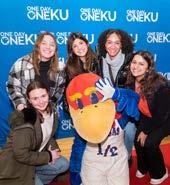

Members of the KU Endowment team celebrate another successful One Day. One KU. with Baby Jay.


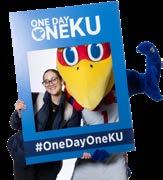

 STUDENT SNAPSHOTS: Students hang out with their favorite mascot and join in the day’s excitement at photo booths around campus.
STUDENT SNAPSHOTS: Students hang out with their favorite mascot and join in the day’s excitement at photo booths around campus.
www.kuendowment.org 13
SUPPORT FOR FINALS AND THE COMMUNITY
KU FINALS SURVIVAL KITS BENEFIT PROGRAMS ON AND OFF CAMPUS
BY EMILY BECKER
For KU students, finals week each semester can be a stressful time, filled with late-night studying and early morning coffee runs. For donors, the week is a chance to support not only students but the greater Jayhawk community through KU Endowment’s KU Finals Survival Kits program.
The initiative launched in fall 2019 with the simple idea to engage KU parents through the opportunity to send their students a package of snacks and KU swag items during finals week. That semester, the team hoped to sell 200 kits, and they were thrilled when the number of kits ordered totaled more than 500.
Since then, the program has grown by more than 300%, raised more than $60,000 to support initiatives
countering food insecurity on campus and helped establish a partnership between KU Endowment and Cottonwood Incorporated, a Lawrence nonprofit organization that provides services to individuals with intellectual or developmental disabilities.
“The Finals Kits are a little thing we can do that can have a big impact with students in multiple ways,” said Ricardo Zamora, senior multichannel campaign coordinator at KU Endowment. “During finals week, students tend to feel lots of overwhelming emotions — stress, fear, anxiety — and that can really get in the way of studying, how exams go and their overall academic success. And when you throw hunger into the mix, students may have an even harder time focusing.”
Before a KU Finals Survival Kit arrives in a student’s hands, it is assembled at Cottonwood as part of its Cottonwood Industries program, which employs about 140 individuals who are experienced in manufacturing
THE IMPACT OF A KU FINALS SURVIVAL KIT
Step 1 — A donor sends a kit to a specific student or donates one to a student in need.
Step 2 — The kit is assembled at Cottonwood Industries, part of a Lawrence nonprofit that supports individuals with intellectual or developmental disabilities.
Step 3 — Jayhawks receive their kits and ROCK CHALK their way through finals.
Step 4 — Donated kits and proceeds from the program are given to programs such as the Campus Cupboard to reduce food insecurity on campus.
14 KU | Spring 2023
and production jobs that need to be completed by hand. There, the associates package each kit in a bright blue or crimson box, adding items such as packs of granola bars, cookies and crackers as well as nonperishable KU-branded items that change each semester. In the past, the kits have included a beanie, stress ball, sunglasses and phone screen sanitizer.
Cottonwood has been partnering with KU Endowment on the project since the beginning, and according to Robert Bieberle, business development manager at Cottonwood, it is one of the staff’s favorites. “We never have to ask, ‘who wants to work on this project?’” he said. “We’ve got a ton of Jayhawks out there.”
He said that while Cottonwood associates may not have experienced the stress of a university finals week themselves, putting together a package that will help raise the spirits of a KU student makes them happy.

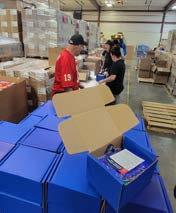
The partnership also gives KU Endowment the chance to support the larger Lawrence community and raise awareness of Cottonwood’s work.
“For our staff, it is important to see the impact of our work,” Zamora said. “We’ve taken tours of Cottonwood, and our employees have been able to see how the impact goes beyond the university.”
After assembly, the kits are distributed on campus the week before finals. But a finals kit’s benefit does not end once it is delivered. When ordering, donors have the option to send a kit to a specific student or students, donate one to a student in need or both. The donated kits as well as all proceeds from the program are given to initiatives that work to end food insecurity among KU students, such as the Campus Cupboard on the Lawrence campus.
Nearly one in three KU students struggles with food insecurity, according to a 2018 survey. Sarah Ross, case manager in the KU Student Support office, said the Campus Cupboard is currently busier than ever, including a 166% increase in number of visits this February compared to February 2022.
“We really believe food insecurity is not just addressing food. It is a basic needs insecurity because of how much it impacts those who are facing it,” Ross said. “Food insecurity impacts academics and physical health, but also emotional health. We have to ask, if a student is unable to access food, what else aren’t they able to access or afford?”
The monetary donation from the Finals Kits program helps Campus Cupboard staff the location, restock the shelves with nonperishable food items and fund Food for Jayhawks, the dining plan that is part of the network of emergency aid available for students. The donated kits themselves are made available to students through the Campus Cupboard, who also appreciate the extras in the kits that aren’t just snacks.
“We always get such great feedback from people in our space, and the kits are really helpful,” Ross said. “It is a nice pick-me-up during finals.”
As for future finals weeks, Zamora hopes to expand the Finals Survival Kits program to assist more students and programs at KU while also deepening outside partnerships.
“KU Endowment is more than just raising money,” he said. “It is building relationships and building a better community in any way that you can give your time, talent and support. This is a great example of that.”
www.kuendowment.org 15
PACKAGING CARE: Work services coordinator Steve Steinbach (left) and Cottonwood Industries team members assemble KU Finals Survival Kits for the fall 2022 semester.
LEARNING WHILE SERVING
JAYDOC FREE CLINIC CELEBRATES 20 YEARS OF CARE
 BY PAMELA URLACHER
BY PAMELA URLACHER
The idea for the JayDoc Free Clinic began in the early 2000s when Jenny Koontz, third-year medical student, and fellow students at KU School of Medicine attended a lecture featuring speakers talking about safety-net clinics. Koontz and a small group of students got to work creating the plan for a clinic in Kansas City, Kan., to serve the community near KU Medical Center. Since then, students have strengthened the clinic and volunteered their time to provide quality medical care while enhancing their skills.
Proud to be celebrating its 20th anniversary, the JayDoc Free Clinic has served more than 20,000 uninsured and underinsured people in the greater Kansas City area. The student-run clinic focuses on giving back to the community and offers services Monday–Wednesday every week. Patients can receive free non-emergency urgent care and screenings, along with the opportunity to attend the clinic’s nine specialty nights for specific services such as cardiology, women’s health, diabetes, dental and radiology offered on select evenings.
The volunteer clinic operates with the help of faculty advisers. The advisers meet with the student board leadership to discuss all areas of clinic oversight, operations, new projects, reporting, accreditations and following up with all student service providers about aspects of patient care.
“The Jaydoc Clinic is nationally renowned. It’s a free clinic that is considered to be in the top echelon among student-run free clinics,” said Dr. Laurel Witt, JayDoc Clinic faculty adviser, former student director and KU School of Medicine graduate. “Our students are innovative, focused on community service and take care of nearly double the number of patients other schools’ free clinics manage.”
Students from all phases of their medical academic career are encouraged to volunteer with the JayDoc Clinic. Undergraduate premedical students from KU
16 KU | Spring 2023
MENTOR MINUTES: JayDoc Clinic advisers Dr. Lauren Witt and Dr. Allen Greiner discuss clinic operations with former student directors Maggie Malmberg and Michael Arnold.
are given the opportunity to volunteer as front desk interns, focusing on social service work, paperwork, administrative tasks and interpreting for patients who have language barriers.
A vast majority of JayDoc Clinic patients speak Spanish, creating a need for bilingual medical professionals within the Kansas City community. Michael Arnold, current second-year medical student and former JayDoc executive director, began his journey in the clinic as an undergraduate interpreter and returned during medical school.
“It has been the most meaningful experience for me in medical school, because even as a first-year student, you’re seeing and interacting with patients, faculty members and community physicians who are showing and teaching us firsthand how to be a doctor,” Arnold said. “The real takeaway is being able to work with underinsured and underserved populations in Kansas City. It taught me a lot about the kind of doctor and the kind of leader I want to be.”
The JayDoc Clinic model was so successful, it was replicated by students at KU School of MedicineWichita. The JayDoc Clinic in Wichita opened in 2005 in partnership with Guadalupe Clinic and serve hundreds of patients each year.
Students are the sole reason the clinic can serve and provide resources to the communities they serve. This passion and commitment are shown through the care patients receive and the growing number of patients seen each year.
“I have had a patient who I’ve seen multiple times for diabetes control. It’s been neat to follow up with
STUDENT LEADERS: JayDoc Clinic student volunteers
Michael Arnold and Maggie Malmberg strengthened their patient care skills while serving the community. “It’s a unique opportunity for learning how to interact with patients and how to present to physicians,” Malmberg said.

him over the last two years, setting goals and managing his diabetes,” said Maggie Malmberg, former JayDoc director of fundraising and current second-year medical student. “Getting to follow patients over time and see the changes in their health is a unique aspect of our clinic.”
JayDoc Clinic offers experiences and support for students unlike any other, helping them become lifechanging physicians and community leaders.
“It amazes me how smart and talented these students are and what they can accomplish,” said Dr. Allen Greiner, JayDoc faculty adviser and KU School of Medicine graduate. “I’ve been really lucky to be involved, and others would say the same.”
KEEP THE COMMUNITY HEALTHY
You can help JayDoc Free Clinic provide medical care to individuals in need by donating at kuendowment.org/jaydoc.
“ It makes me feel good to be able to interact with students who are energetic and excited to help people. I’ve been rewarded with those interactions from eager students who are smart and talented.”
ALLEN GREINER, JAYDOC FACULTY ADVISER
www.kuendowment.org 17
WHAT’S IN YOUR BACKPACK?
“THE SWEATER MY GRANDMA KNIT
WHEN MY MOM WENT TO KU,” SAID SADIE WILLIAMS, a KU senior studying economics and English with a Spanish minor. “It has a huge Jayhawk on the front and represents that I’m grounded in my upbringing. First and foremost, I’m a Jayhawk.”
Williams spends her time searching for ways to strengthen the community. She has been a member of the KU Student Senate since her freshman year and is the current Student Body President. Through her role, Williams hopes to be the voice for students on campus. “It all shows the impact students can make at KU. I can’t think of anything I am prouder of.”
The recipient of multiple scholarships, Williams credits this support as helping shape her KU experience by allowing her to focus on serving the student body and community. “I wouldn’t have

been able to get as involved in Student Senate, my sorority or the Center for Community Outreach.”
Because of her passion for education and helping people find their voices, Williams selected her three fields of study to be all encompassing. She plans to enter law school after graduation and also enjoys the creative sides of literature and language. “It’s a good balance between the skills I’ll need in the future while still doing things I just genuinely enjoy doing.”
Williams plans to continue focusing on the KU community and uplifting the students around her. She is looking forward to furthering her education and hopes to change the world as she sees it today. “KU wouldn’t be as strong of a university and have as many offerings for students without the individual donors who make that a reality. I am so genuinely thankful.”
PAMELA URLACHER
KU STUDENT PORTRAIT 18 KU | Spring 2023
WHAT’S IN YOUR BRIEFCASE?
“MY COMPUTER,” SAID PERRY ALEXANDER, PH.D., AT&T Foundation Distinguished Professor of Electrical Engineering and Computer Science and Director of the Institute for Information Sciences at the University of Kansas. “It reminds me of where we’ve been and where we’ve come. I have lived through computing basically changing the entire world.”
Alexander has been part of shaping the future of technological advances as a KU faculty member for nearly 25 years and as author and co-author of more than 130 publications. His students inspire him to be the teacher and researcher he is today. “Watching my students achieve the things they set out to achieve, that’s what it’s about. I love my research, and I appreciate my research accomplishments and achievements, but I always think about who I was working with at the time.”

Private support has helped the KU Institute for Information Sciences flourish in research, education and opportunities. Because of a gift
from Ripple, Alexander and students are working on the University Blockchain Research Initiative (UBRI). This initiative provides resources for faculty and future tech leaders to explore new ideas such as biodiversity data, blockchain infrastructure and blockchain as art. “The grant has changed the world for us. We can do things and explore things that we just could not do before.”
Alexander is also the principal investigator for the Securing Our Worlds: Physical, Digital, Social project that received one of four $3 million awards in KU’s Research Rising competition. The team will be focused on creating more secure and resilient communities. “Support helps our students focus on their research and allows me to see an interesting idea that we don’t have government funding for yet grow into something that does result in funded research. It helps build our community.”
PAMELA URLACHER
KU FACULTY PORTRAIT www.kuendowment.org 19
CAMPUS HAPPENINGS
#1
Kansas Women’s Basketball won its first WNIT Championship by defeating Columbia University 66–59 in Allen Fieldhouse on April 1, 2023.
NURSING GRADUATE STUDENT IMPROVES HEALTH ON THREE CONTINENTS

PHARMACY PROFESSOR’S ESTATE GIFT WILL FUND $1.6 MILLION IN SCHOLARSHIPS
A bequest from the estate of Gary Grunewald, who spent 50 years on the faculty of the KU School of Pharmacy, has established an endowed scholarship fund for pharmacy students. The $1.6 million gift will fund two full-tuition scholarships each year. “Gary Grunewald’s philanthropy is a remarkable legacy and a tribute to his lifelong passion for science and teaching,” said Dean Ronald Ragan. As a mentor and doctoral adviser, Grunewald helped launch the careers of more than 40 graduate students in medicinal chemistry and countless others who were under his guidance as postdoctoral scholars. He retired in 2016 and died Feb. 20, 2023.
NEW FELLOWSHIP PROGRAM AT KU SCHOOL OF MEDICINE-WICHITA

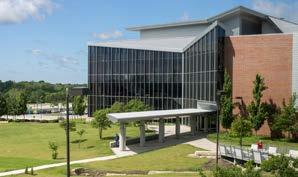
Public and private donors have provided the seed money for KU
School of Medicine-Wichita to launch a new two-year fellowship this summer to train more child and adolescent psychiatrists in Kansas. The need for highly trained professionals who can best evaluate, diagnose and treat the mental health of young people is critical and continuing to grow. One in five youth in the state meet criteria for a mental health diagnosis and more than 35,000 are severely impaired as a result. Based on demand, Kansas could use more than 400 child psychiatrists; there are currently 60, working primarily in the northeast part of the state. Support for the program has come from the Patterson Family Foundation, city and county leaders, Wichita businesses and members of the community. To donate, please contact Brad Rukes at brukes@kuendowment.org or 316-293-2641.
May Maloba is making a difference in women’s lives. The KU School of Nursing doctoral student is bringing her expertise in women’s health to Africa, Asia and North America. In her native Nairobi, Kenya, Maloba has advocated for services needed to improve the health of women and children. She has trained medical professionals to increase preventative cervical cancer screenings in Cambodia. And in the United States, she has coordinated research that improves the survival chances for infants born to mothers with HIV. The focus of Maloba’s dissertation — and her latest project — involves the human papillomavirus (HPV) vaccine, which has been shown to significantly reduce the number of women who develop cervical cancer.
ACROSS KU 20 KU | Spring 2023
KU nursing student May Maloba (right) connects with Sarah Kessler, Ph.D., MPH, associate professor, KU School of Medicine.
TWO PROFESSORS RECOGNIZED FOR EXCELLENCE IN TEACHING


Cynthia Colwell, professor of music therapy & music education, and Mark Mort, professor of ecology & evolutionary biology are the recipients of the 2022 Chancellors Club Teaching Professorships. Colwell joined the School of Music in 2000 as the director of the Music Therapy Clinic and later became the program director for music therapy. Along with teaching, she has served as an academic adviser and been committee chair for 55 master’s theses and 11 doctoral dissertations. Throughout Mort’s 22 years with KU, he has taught graduate and undergraduate courses and is currently an associate director in the Center for Teaching Excellence (CTE). In addition to mentoring postdoctoral researchers, he has served as co-principal investigator on multiple external grants on best practices in STEM education. Both honorees will receive an annual $10,000 honorarium for each of the next five years.
CELEBRATING 100 YEARS OF THE 1923 JAYHAWK
KU sophomores James O’Bryon and George Hollingbery designed this Jayhawk and earned money by painting it on windshields of cars going to the KU vs. Nebraska football game. They also decorated store windows in downtown Lawrence with the “duck-like” image that appeared on jackets, sweaters and uniforms for several years.
ANONYMOUS PLEDGE TO THE MARTIN CENTER FOR CONSTRUCTION SAFETY
The Craig & Diane Martin National Center for Construction Safety at the KU School of Engineering received a 10-year pledge from an anonymous donor to help fund ongoing operations. The $750,000 donation will be used to hire investigators, support research, conduct construction safety studies and host activities such as seminars and conferences.
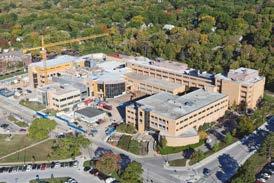
The pledge follows the $3.5 million donation Craig and Diane Martin made in 2018 to establish and endow the center. “There is ample opportunity to do things that could help impact both injuries and fatalities in the industry,” said Craig Martin, noting there are roughly 1,000 fatalities at U.S. construction sites every year and more than 100,000 globally.
KU WELCOMES UKRAINIAN SCHOLARS
After the invasion of Ukraine in February 2022, the University of Kansas began working on several initiatives to support academic peers in the country. The Department of Slavic, German & Eurasian Studies sought funding to support graduate students and faculty whose education and work had been disrupted. Fundraising efforts during March and April allowed four graduate students and one faculty member to be funded for the 2022-23 academic year. KU has a long history and relationship with Ukraine, regularly offering Ukrainian language instruction, study abroad opportunities and hosting numerous visiting scholars and graduate students, including two tenured Ukrainian professors. Chair Ani Kokobobo said the department is grateful to everyone who contributed to the effort.
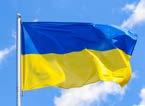 Cynthia Colwell Mark Mort
Cynthia Colwell Mark Mort
ACROSS KU www.kuendowment.org 21
Learned Engineering Expansion (2011)
DYNAMIC DEVELOPMENT PLANNED FOR WEST DISTRICT
THE CROSSING AT KU, a vibrant mixed-use development, is coming to the west side of the University of Kansas Lawrence campus. Located at the intersection of 21st and Iowa streets, the development will include retail, dining and living spaces and offer a unique environment to live, work, play and discover. The project is expected to attract and retain companies, researchers and entrepreneurs that support opportunities created by a major international research university.
The Crossing is near the research and office facilities of KU Innovation Park and will position the region for future growth. KU Endowment acquired much of the property — known today as the West District — in 1942 with the intent to support the university. Funding for the project will come from two primary sources: rental income from tenants and start-up funding from KU Endowment for the initial investment in infrastructure.
“The primary objective of the development is to set the KU research enterprise apart from other universities by creating an environment to attract the next generation of companies and researchers that align with KU’s strengths,” said Monte Soukup, KU Endowment senior vice president of property.

One of the more exciting aspects of the project is determining who will occupy space in The Crossing. The development is envisioned to bring new businesses to the Lawrence market, offering products and services that do not currently exist or are underserved in the area. This is a special opportunity to create a destination that reflects the unique character and charm of Lawrence. The Crossing at KU will bring together academia, residents and visitors to create innovation, encourage curiosity and strengthen the entire community.
JODI BOUYACK
ACROSS KU 22 KU | Spring 2023
The Crossing at KU
STRENGTHENING KU TIES


WHEN YOU RECEIVE A LETTER IN THE MAIL FEATURING A CAMPUS INITIATIVE, an email from the chancellor illustrating the impact of unrestricted support, a text message or phone call about the university’s 24-hour day of giving, One Day. One KU., it’s all about connecting the KU community of alumni, friends and donors to the people and pursuits of the University of Kansas.
Engaging with KU alumni and friends in creative ways and strengthening the university’s base of support is at the heart of KU Endowment’s Annual Giving program. We connect people to their passions and help build long-standing relationships through programs such as Jayhawk Faithful for donors who make a gift to any area at KU for two or more consecutive years.
Our efforts engage the entire KU community and help to build a greater university than the state alone can build. Annual Giving is the door through which a donor connects with both KU Endowment and the University of Kansas. We inspire donor and alumni support by meeting Jayhawks where they are and discovering

the areas most important to them. We tell stories illustrating the impact of private support on the KU community and show donors how their gifts are used. By connecting with each donor on a personal level, we inspire the drive to support the university philanthropically.
Initiatives like LaunchKU and One Day. One KU. empower us to respond to unique funding opportunities across the university. LaunchKU uses crowdfunding to raise funds benefitting the KU community. Generous donors provide matches and challenges to further their impact on One Day. One KU. as Jayhawks and friends from around the world come together to support all five campuses and The University of Kansas Health System.
The collective power of KU Endowment’s Annual Giving program is transformative. Its success lies in the act of creating and maintaining relationships, consistent giving — regardless of the amount — and providing opportunities for alumni and friends to be part of elevating the University of Kansas far into the future.
EMILY KRUSE
OPENING DOORS: This image from a recent giving appeal showcases some iconic and newer campus entrances. The message inside connects unrestricted support to opportunities for students, faculty and programs.










































KU ENDOWMENT 101 www.kuendowment.org 23
JAYHAWK’S GENEROUS SPIRIT CONTRIBUTES TO LONG LIFE
ON A WINDY SPRING DAY IN 2023, 95-YEAR-OLD JAYHAWK LEE KETZEL
stepped out of the driver’s seat onto the sidewalk at KU Endowment. As she glided through the sliding glass doors with a big smile, it was quickly apparent her resolute demeanor is what has carried her through decades of providing for both her family and community.
During a summer trip to Western Europe to study the economic recovery in action post World War II, Lee met her beloved husband, Cliff. Their mutual interest in politics and foreign policy created an inseparable bond. They soon married, and in her pale green Chevy convertible, took off to Washington, D.C., where Cliff began a job with the state department. With some real-life experiences under their belts, they made their way to Berkeley, Calif., where Cliff completed his dissertation — he wrote it, she typed it. Opportunity soon knocked at the University of Kansas, and the couple fell in love all over again — with the university, the political science department and Lawrence community where they would raise their three boys.

While juggling family, various volunteer efforts and social engagements, Lee obtained her master’s degree in English from KU in 1970. She began teaching English composition and English as a second language to international students at the university. Lee’s ability to connect with people, paired with her colorful life experiences, have best been demonstrated through her philanthropic and giving spirit. Whether she was fighting for better care in nursing homes as a founding member of Kansas Advocates for Better Care or advancing the arts with the Kansas Arts Commission and Spencer Museum of Art, her passions have always been evident.
When Cliff died suddenly at the age of 66, Lee turned tragedy into a gift to the University of Kansas. In memory of their worldly travels and his contributions to foreign policy and international relations, the Ketzels established a scholarship fund intended for underrepresented students in the political science department. Her charitable contributions have touched countless lives as a Jayhawk Faithful donor for 45 years with gifts to art and theatre, KU Libraries, the Lied Center, Women Philanthropists for KU and more. A treasured Jayhawk, Lee carries the torch for her husband and our community each day with her grace and generosity.
Oh, and her secret to a long life? A glass of orange juice every morning and a bourbon Manhattan every night. Balanced and adventurous, just like Lee.
DARYL BELL
JAYHAWK FAITHFUL 24 KU | Spring 2023
LIFETIME OF LOYALTY: KU alumna, former faculty member and donor Lee Ketzel has been supporting the university and Lawrence community since the 1970s.
ARTFUL EXPERIENCES
VISITING AN ART MUSEUM SHOULD BE thought-provoking but also accessible, inclusive and welcoming. The Spencer Museum of Art’s recent fourth floor renovation aims to better serve the needs of its audiences as part of ongoing improvements.

“The reimagining of our fourth floor has created new and captivating spaces for gathering, learning and connecting with art and with each other,” said Saralyn Reece Hardy, Marilyn Stokstad Director of the Spencer Museum of Art.
New York architecture firm Pei Cobb Freed & Partners helped the Spencer Museum reconceive the space and the way visitors experience the museum’s collection, which exceeds 48,000 objects.
New white oak flooring and energyefficient lighting improve the aesthetics. Expanded gathering spaces, increased flow of light into the building and creating a new 1,150-square-foot multipurpose study space were part of the redesign. Named the Ingrid and J.K. Lee Study Center, the space is available for class and research visits as well as temporary installations and public programs promoting arts engagement. The late J.K. Lee was a professor in KU’s
Department of Chemistry for nearly 25 years. Ingrid Lee continues to support KU through the family’s foundation.
Of all the changes, the most exciting is the way the galleries are designed to encourage visitors to find connections between their experiences and the art on display. Objects are grouped thematically to inspire conversations across cultures, space and time. Four themes are represented in the new galleries: Intersections, Empowerment, Displacement and Illumination. Pieces created by artists from diverse backgrounds were chosen to represent a broader range of voices and identities, providing a better understanding of narratives and experiences from around the world.
In addition to individual donations, funding for the $4 million project was provided by government and private foundation grants, including two grants from the National Endowment for the Humanities totaling $800,000. The collections at the Spencer Museum of Art include contemporary and historic artwork in all mediums from cultures across six continents. Admission to the Spencer Museum is always free, with donations welcome.


SHELLY TRIPLETT
TIME & PLACE www.kuendowment.org 25
NOW OPEN: Spencer Museum of Art’s new fourth-floor galleries are ready for visitors.

P.O. Box 928 Lawrence, KS 66044-0928 Non-Profit Org. U.S. Postage PAID Lawrence, Kansas Permit No. 72
Thank you for helping build a greater KU.
FRIENDLY FACE ON CAMPUS: Big Jay’s heart is right at home on Jayhawk Boulevard in front of Dyche Hall’s stately tower.













 Ashley (Kumlien) Schneider
Ashley (Kumlien) Schneider











 BY PAMELA URLACHER
BUSINESS PARTNERS: Local companies show their support for the University of Kansas.
STUDY “BREAK”FAST: KU Medical Center students enjoy pancakes and a photo booth for One Day. One KU.
BY PAMELA URLACHER
BUSINESS PARTNERS: Local companies show their support for the University of Kansas.
STUDY “BREAK”FAST: KU Medical Center students enjoy pancakes and a photo booth for One Day. One KU.






 STUDENT SNAPSHOTS: Students hang out with their favorite mascot and join in the day’s excitement at photo booths around campus.
STUDENT SNAPSHOTS: Students hang out with their favorite mascot and join in the day’s excitement at photo booths around campus.


 BY PAMELA URLACHER
BY PAMELA URLACHER









 Cynthia Colwell Mark Mort
Cynthia Colwell Mark Mort








































